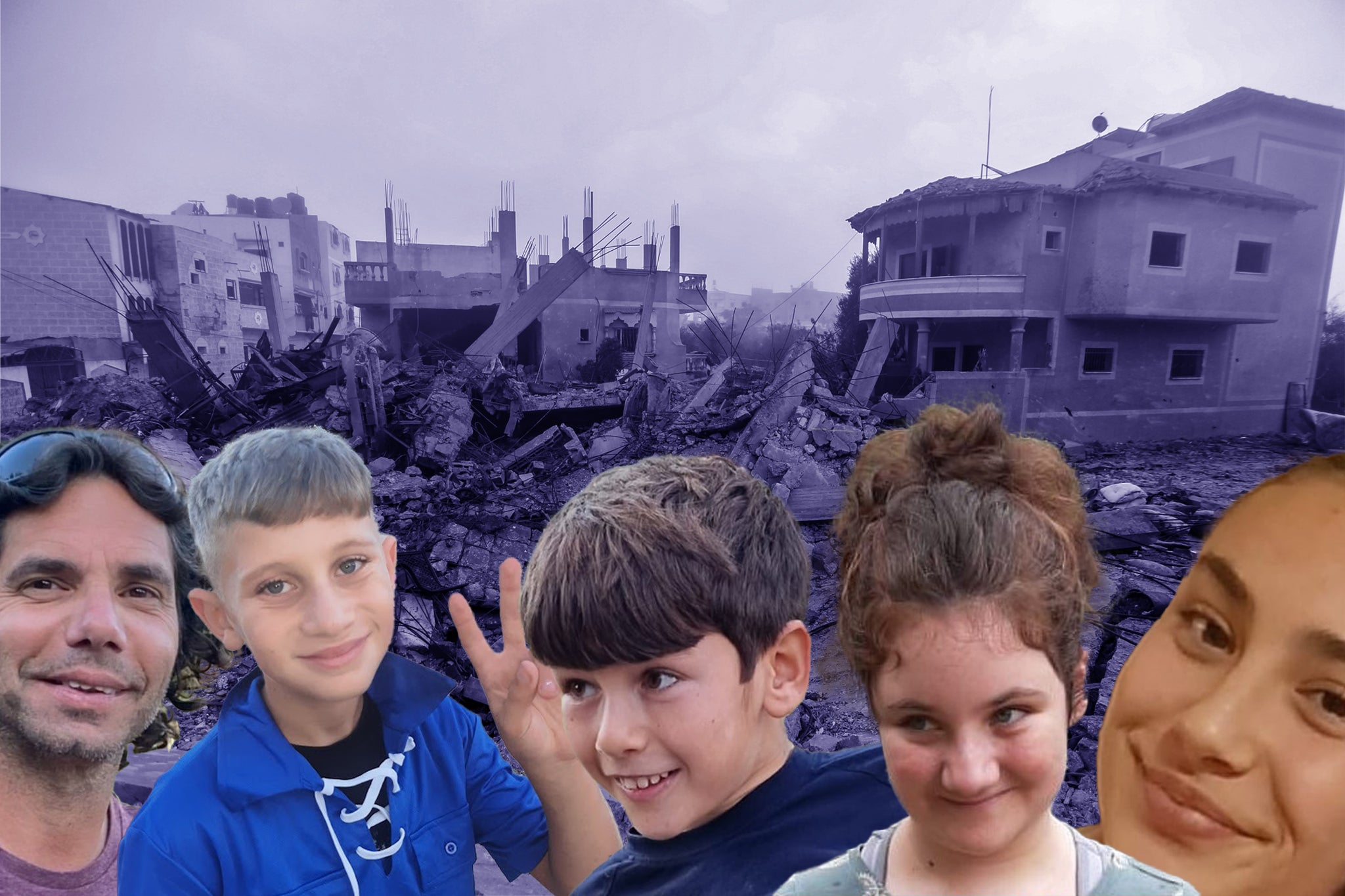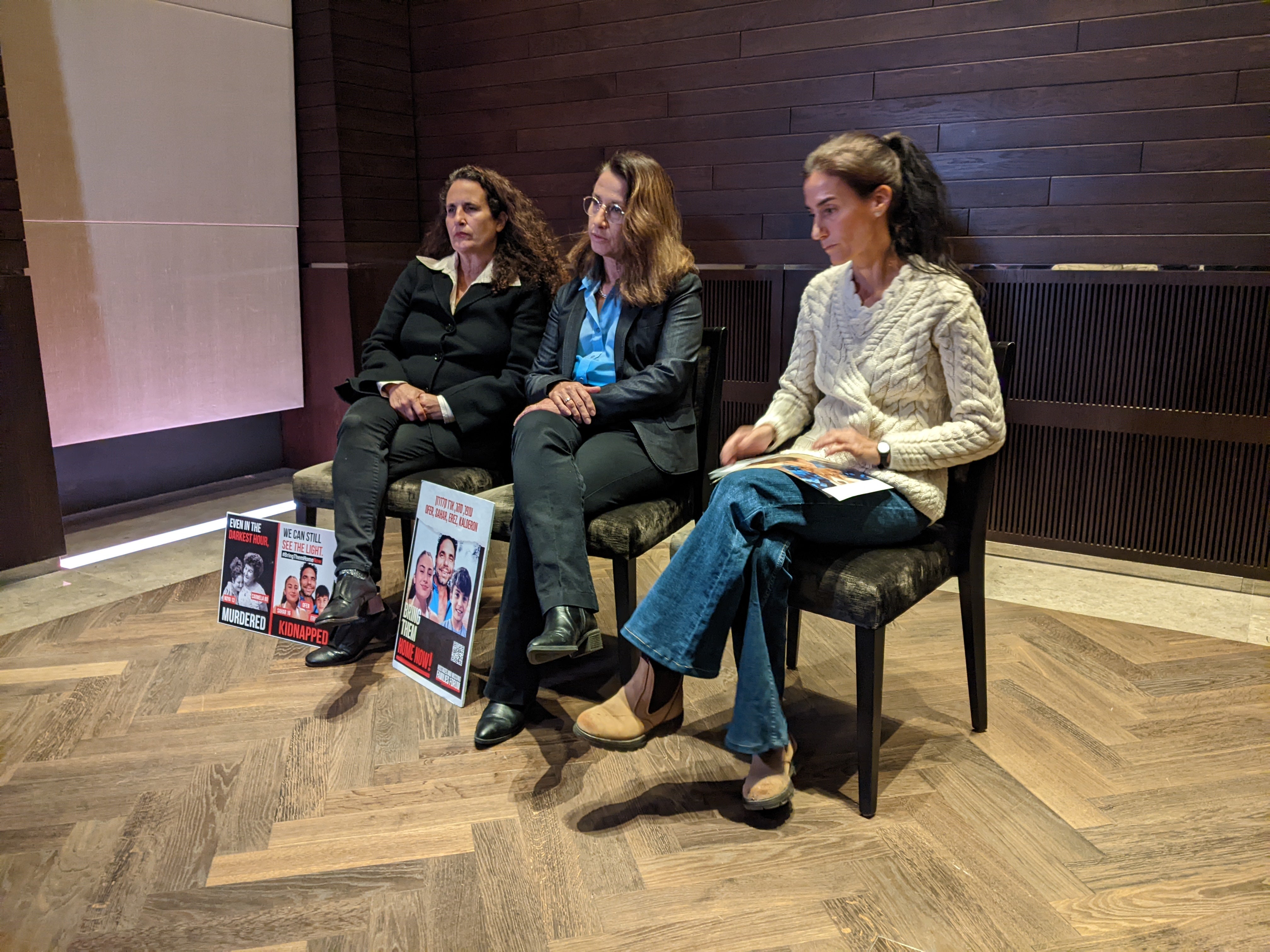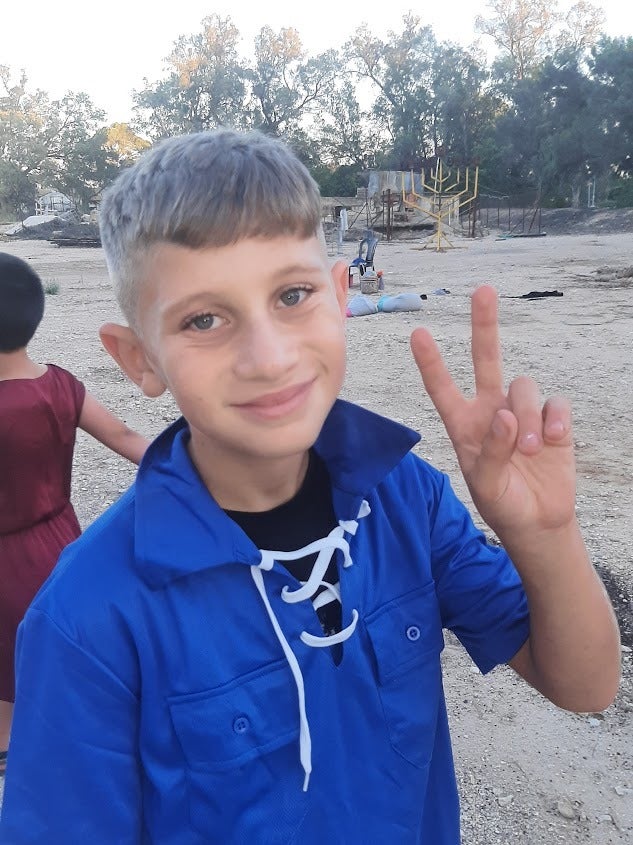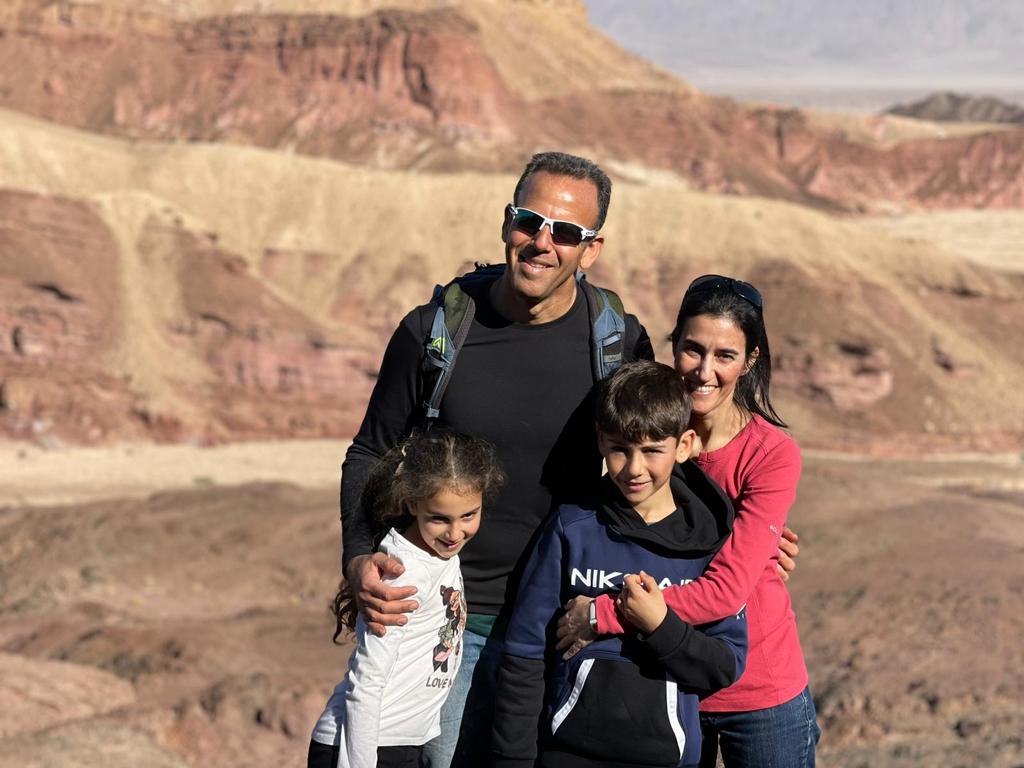‘Imagine for one minute your child, your helpless sensitive child, just disappears one day...’
A month on since Hamas raided their small village in Israel, three mothers tell Guy Walters about the terrible day their children were taken from them as their homes burned to the ground – and the unbearable pain they have lived with ever since


These women should not be here. They should be nowhere near this private location in central London, thousands of miles from their homes, talking to strangers. They should not be having to tell their stories to us, but they are stories that they know must be heard, no matter how painful. Telling how their children have been kidnapped, and family members murdered. We should not have to watch their tears or hear their voices tremble. It feels intrusive, a grotesque violation of their innermost agony. But just as they must speak, we too must listen, because if we do not, then there is no hope.
These three mothers, from a small village in Israel, are today at the centre of world events. Until a month ago, it is fair to say that none of them would have expected to spend their days talking to the world’s media, dealing with public relations executives, or lobbying ambassadors and politicians. In a sense, Renana Jacob, Batsheva Yahalomi, and Hadas Kalderon were ordinary women, but they most certainly no longer are.

Their lives changed on the morning of 7 October. That was when Hamas gunmen came to their kibbutz, Nir Oz. Until then, it had been an ordinary morning, or what passes for ordinary when you live near Gaza.
“It was just a normal Saturday morning,” says Renana, the mother of two sons, Or and Yagel, aged 16 and 12. “My two boys were sleeping in their beds, and I was away. The alerts went off, but even that was normal in our ‘normal’ world. So I just made sure that they were in the safe room, and I thought that was it. But then we started hearing gunshots, [and] we realised that it was not a normal Saturday morning, and not a normal rocket attack.”
Renana, who was visiting a nearby kibbutz, started getting text messages from friends and neighbours saying that gunmen were swarming all over the village.
“This is the moment when I realised that this is the end,” says Renana, her voice breaking. How she manages to get the rest of her story out defies belief, but through tears, she manages.
“My youngest [12-year-old Yagel] was whispering on the phone to me, ‘They’re coming in now.’ My other son was trying to hold the safe room door shut. He thought he was strong, but he was not strong enough. The last thing I heard Yagel say was ‘Don’t take me, I’m too young.’ I could hear him on the phone, he was begging for his life. This can’t be the last call any mother gets from her children.”
Hamas kidnapped Renana’s two boys and took them to Gaza. Today, she has no idea of where they are being held, or if they are even alive. “You can’t sleep because you’re thinking of whether they’re sleeping, you can’t eat because you’re thinking if they’re eating, you can’t shower because you’re thinking of what conditions they’re being kept in.
“Our lives stopped on 7 October and have been on hold ever since. Every minute that passes by is a wound that will take years to heal.”

When you hear the stories told by these women, it is hard not to be reminded of the Holocaust. Not the Holocaust of Auschwitz and the gas chambers, but the Holocaust of mass shootings carried out by men who regarded the Jews as vermin. What happened at the likes of Nir Oz is reminiscent of the actions of the Einsatzgruppen, the death squads who went into towns and villages and slaughtered 2 million people simply for being Jewish.
Be in no doubt that the horrors inflicted on the families of these three mothers sitting in a room on a weekday afternoon in London are the manifestation of a present-day pogrom. Killing and kidnapping children is not an act of revenge for a stolen Palestine, but an expression of genocide enshrined in Hamas’s own charter that all Jews must be killed.
Two of those killed that day were Carmela Dan, 80, and Noya Dan, 12. They were the grandmother and niece of Hadas Kalderon, who sits to the right of Renana. Her voice is strong and loud, and her words are steeped in anger. Like Renana, she has two children who have been kidnapped – her daughter Sahar, 16, and her son, Erez, 12. Her husband Ofer, 53, was also taken.
“I just want each one of you to try to imagine, for one minute – one minute – your child, your helpless, sensitive child, just disappears in one day. Disappears from your life in a cruel way. Just imagine it, and then you don’t have to ask us how we feel. I want you to feel. I want you to go deep inside your heart and understand. Can you imagine this?”

The audience of journalists and photographers stays silent. Like everybody else in the room, I try to imagine how I would feel had my children been kidnapped, but it is impossible. And even if I were able to do so plausibly for just one minute, that is nothing compared to the 45,000 minutes for which these women have been waiting for their families to come back, and perhaps the many, many thousands more they may yet have to wait.
These women talk of their lives having been stopped, and how there is no night for them, because there can be no true sleep when you do not know if your children are alive or dead, and if they are alive, how they are being kept.

The last image Batsheva Yahalomi saw of her 12-year-old son, Eitan, was when he was being taken into Gaza on a motorcycle. Although Batsheva and her daughters, aged 10 and 1, were also similarly abducted, she and her girls managed to escape after the motorcycle they were on fell over. She recalls that ride through hell. Her voice is monotone and calm. Occasionally she needs a word translated, and Renana and Hadas are ready to help her.
“It was burning,” says Batsheva. “Everything was burning. The houses, the cars, the trees. Nothing left. There were hundreds of terrorists in the kibbutz. They were burning, they were destroying. They were looting everything. They went out of the kibbutz with televisions, with everything they could take. It was so surrealistic.”
Batsheva has no inkling what has happened to Eitan, or indeed to her husband Ohad, who was shot in the legs as he tried to prevent the armed gunmen from getting into the family’s supposed safe room. His body has not been found, so it is assumed that he was kidnapped.
When you listen to these women, and hear them describing how their children were taken from them, it becomes unthinkable that there are people in this same city who have torn down posters showing images of the kidnapped children. But a month since their children were torn from them, that is where we are at. How quickly someone else’s living horror has turned into another’s sickening moral righteousness.
“Violence is the wrong way to live your life,” says Batsheva, “and the wrong way to raise your child. Whoever is doing this is practising violence. I wish those people would look at the photos before they take them down, and think of them as their own child.
“Being pro-Palestine is fine by me. But I think the Palestinians are also held hostage. If it was the other way round, I wouldn’t tear down the posters, [I would] probably hang them up.”
As the violence spreads throughout the region, the health ministry in Palestine estimates that more than 4,000 children have now been killed there – numbers that are equally unthinkable. But it is clear that these women feel that the Palestinians are equally being held hostage by Hamas, and not by Israel. It is this organisation and its acts of terror that have brought these women here, thousands of miles from their home, to speak words that none of us should have to hear. But these three mothers must speak, and we must listen.
Join our commenting forum
Join thought-provoking conversations, follow other Independent readers and see their replies
Comments
Bookmark popover
Removed from bookmarks